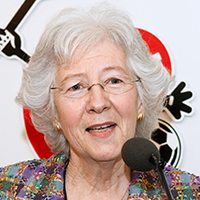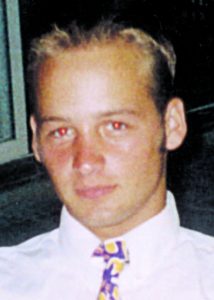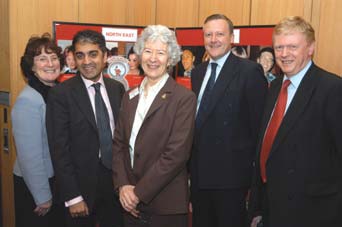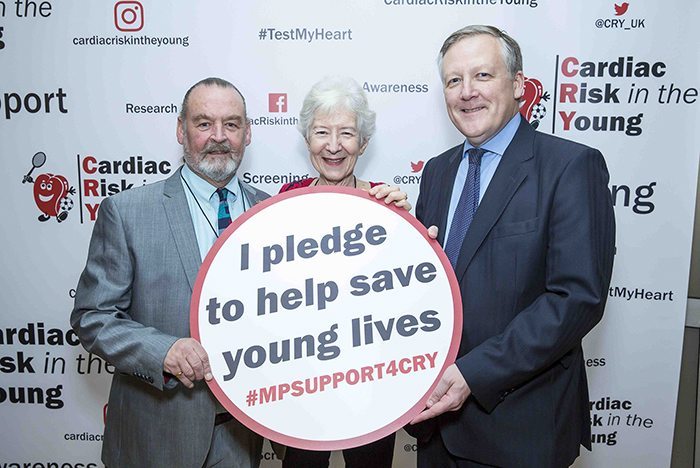
Alison’s column from Update 72

By the summer of 1998 Adrian Woodhead, a quiet shy young man, had received a response from several of the then 659 sitting MPs to whom he had sent a handwritten letter. These letters told of the young sudden cardiac death of his wife, Sarah, who had collapsed and died in his arms just before Christmas. Her dream in life was to have a family, and it was at first assumed her symptoms of nausea and fainting were due to pregnancy. She was 28 and dressing to visit the GP, who wanted to test her for epilepsy, when she died of Arrythmic Right Ventricular Cardiomyopathy (ARVC). Adrian wanted these MPs to know that not only was cardiomyopathy treatable if diagnosed, but also genetic and subsequently other family members were at risk. Sarah’s death was preventable – he had learnt that her father had also died of ARVC in his 30s. He wanted to raise awareness with MPs of CRY’s work. In the depths of the most profound despair he wanted to get something done.
Five years later, Jeff Morland, Chairman of Labour Party North, contacted me because his son Levon had suddenly died when out having a beer with his mates. Since he was 12 Levon had been treated for a heart condition called Wolff-Parkinson-White syndrome (WPW), with his cardiologist telling him that his condition was not something to worry about and would just prove to be “a nuisance”. Jeff urged me to contact two friends of his, Kevan Jones and Dari Taylor, both MPs, to raise awareness in the House of Commons.

As a result, we hosted a Parliamentary Reception which led to the instigation of CRY’s All Party Parliamentary Group (APPG). Kevan joined as Chairman, and it was launched in The House of Commons by CRY’s new Patron Sir Ian Botham. Dari had also successfully applied for a Private Members’ Bill. Suddenly we were moving forward – and fast.
I had been advised that the number of MPs that attended Parliamentary Receptions usually averaged ten. So many MPs came storming down to CRY’s Parliamentary Reception that year it broke all records and meant I had to request them to move further into the room due to the queue of MPs waiting outside to get in! MPs speaking on the night highlighted the importance of the impending bill, and the young lives that would be saved if the issue was formally addressed.
Mailshots appealing to CRY families to contact Parliament in support of Dari’s bill resulted in hundreds of letters arriving on the desks of the Department of Health, MPs and even the Prime Minister. The campaign had produced 80 press articles in eight weeks and, crucially, softened the previously intransigent position taken by the Department of Health to the point that they ultimately agreed that a gap in service provision had been identified through Dari’s Bill.
The deluge of letters from bereaved families successfully raised awareness with MPs and the Government’s insistence that young sudden cardiac death was very rare, with only one death a week, was quickly recognised as being hopelessly incorrect. Support for Dari’s Private Members’ Bill, Cardiac Risk in the Young (Screening) Bill, quickly grew.
In the run up to the bill being heard, I was cautioned by several MPs to not expect to achieve anything apart from raising some awareness. Only 11% of Private Members’ Bills heard each year are successful in being passed into law. However, they totally underestimated the cacophony of protest that was generated by our bereaved families, who were insisting something must be done about young sudden cardiac death, and this was the chance to get it addressed.
Dari prepared carefully for her debate, selecting MPs from various constituencies around the country to speak eloquently on behalf of their bereaved constituents. In conclusion, the Health Minister announced the formation of an expert group on Arrhythmia and Sudden Cardiac Death that would include CRY in the consultation process for the formation of a new chapter in the National Service Framework. Speaking afterward, Dari stated: “ …nearly 100 Members of Parliament from nearly all parties offered their support… a substantial majority of whom were MPs who had agreed to support my bill because they had been asked to by their constituents – invariably members of CRY.” The expert group was given five years to scrutinise every aspect of what could and would be done and began its work in 2005, concluding in 2010.
It seemed a sensible time to support these ‘formalities’ by capitalising on the interest raised, and newspaper coverage received, by having our first national raising awareness campaign, inviting MPs to their local launch to meet their constituents. We produced a collection of postcards featuring the face, name and age of eight young people who had died in each of the 12 regions identified – it was hard hitting imagery.

We visited every region during the time of the expert group, impressing that this was happening to at least eight – not one – a week, whilst also stressing it was not as rare as thought and highlighting the link connecting family members. Thousands of postcards were requested, with many MPs saying they had received hundreds and yes, they got the message and would definitely be supporting CRY. It provoked a rush of interested MPs joining our All Party Parliamentary Group, to the delight of Chairman Kevan.
The introduction of Chapter Eight on Arrythmias and Sudden Cardiac Death into the National Health Service Framework has made a significant difference to alerting GPs and cardiologists to young sudden cardiac death. Furthermore, it established the procedure where family members would be tested at specialist centres after a tragedy, or when there was a diagnosis of an inherited cardiac condition – often referred to as “family screening” and/or “cascade screening”. These dangerous conditions started being taken very seriously and were no longer dismissed. CRY’s Professor Sharma became a world leader on the research being done to prevent young sudden cardiac deaths.
However, the impact of these tragedies on those affected has never been fully recognised. The effect on family, relatives and friends of a young apparently fit and healthy person dying suddenly leaves not just an irreplaceable loss, but a deep shock with far reaching consequences.
If you have been affected we would ask you to consider contacting your constituency MP – and to perhaps ask others to contact them as well. There is more information on CRY’s current campaign for all MPs to sign up and support a national strategy for the prevention of young sudden cardiac death at www.c-r-y.org.uk/my-pledge. On this page you can see how to contact your MP as well as find out why a national strategy is so important. Furthermore, utilising the power of social media to raise awareness is ensuring more and more people are hearing about the work we do and the importance of a national screening programme.

If you have never contacted your MP before, the thought of approaching them to raise awareness of CRY might present a daunting prospect. However, having the initiative to contact them will instil a curiosity and hearing your story will make them aware of young sudden cardiac death and the suffering it induces for those left behind.
Saving cuttings from newspapers to show them can have an impact. Highlighting our statistics: how much we support the NHS in what we do by training doctors as experts; providing state of the art medical equipment for the CRY Inherited Cardiac Conditions screening clinic at St George’s; and Consultant Cardiac Pathologist Professor Mary Sheppard, her team and the CRY Centre for Cardiac Pathology at St George’s Hospital.
MPs matter as that is the way our democracy can urge change. But MPs represent their constituents who choose who they want to represent them. They might be in a powerful position but they’re ultimately accountable to you!
Remember that perseverance is persuasive! MPs will take note if you are persistent and do not give up.
Every week I speak to members of bereaved families who tell me of their tragedy and that they had never heard of young sudden cardiac death before. We are trying to not only raise awareness so that EVERYONE has heard of young sudden cardiac death, recognise symptoms when they exist, and what can be done to prevent it, but also to emphasise the terrible impact of these tragedies and how widely felt the ramifications are and for how long.
Alison Cox





